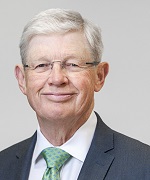Looking for a fund to grow your hard-earned savings can be a daunting task, especially if you have no experience with investing.
The 20-year-olds starting their investing journey recently would have experienced a historic market correction due to the coronavirus pandemic, followed by an even more impressive recovery on the back of central bank support.
As this support gets taken away and inflation begins to persist at high levels for the first time in a few decades, these fund management industry veterans share what they wish they had known about investing when they first started out in their 20s.
Geopolitics don’t affect markets for very long: IBOSS Asset Management’s Chris Metcalfe
“A few lessons have come with nearly 40 years in financial services,” investment director Metcalfe (pictured) said. “The first, which can seem counterintuitive, is that geopolitical events don't tend to affect markets for very long, if at all, adversely. 
“Unfortunately, we are living through the latest horrific example of this with the Russian war in Ukraine.
“It is central bank policy and not awful events filling our TV screens that are moving markets with the obvious exception of energy stocks and commodities, which are spiralling upwards based on the changing supply and demand dynamic.”
Another lesson Metcalfe wish he’d known is to focus on long-term structural changes to market conditions.
He said it doesn't really matter whether the Fed hikes in 50 basis point chunks or lots of 25 basis point moves: “What matters is the direction of travel for rates and how long it takes them to tame inflation, if indeed that is even in their gift, which I personally doubt.”
Although equity market participants “believe that every dip can continue to be bought” he warned that although it has worked for many years, no strategy lasts forever.
He said: “A prolonged period of higher inflation, higher interest rates and equity markets that don't go up in an almost straight line could be upon us.”
Speculation is not investment: Hawksmoor Investment Management’s Jim Wood-Smith
“It was 1985, it was the best of times, it was the worst of times,” Wood-Smith, chief investment officer for private clients, said. “Equities were posting their fourth consecutive year of double-digit returns.
“I, and many fresh and spotty-faced others, had no concept that was a difference between investment and speculation. Surely investment was about buying something one day, and selling the next week (within the same account period) for a profit?
“A long-term investment was something you actually had to pay for, a very long-term investment paid you a dividend (and that meant it was still worth less than you had paid for it). It was fun, it was seductively easy, it was a recipe for disaster.”
Wood-Smith was also a student of politics during that time, where one of his specialities was the Soviet Union.
“To turn the question around, one lesson I learned when I was 20, and which has stayed with me for all the close to 40 years since, was never to trust Russia,” he said.
“Those in the investment world who have done so have misunderstood both history and the difference between investment and speculation. Sometimes the old truths can hit the hardest.”
Make the most of compound interest: Unicorn Asset Management’s Peter Walls
“For me, Albert Einstein’s often stated view that ‘the most powerful force in the universe is compound interest’ must be the best starting point for a lifetime of investing,” Walls, manager of the Unicorn Mastertrust, said.
“All investors should of course be taking a long-term view and reinvesting dividends whenever possible to enjoy the benefits of compounding, but for a 20-year-old the opportunity to embrace risk is far greater.”
He said this means that equities can be large parts of a portfolio and that a young person can consider adding higher risk/higher return investments such as smaller companies or emerging markets.
“And those inclined to devote greater effort to their investments can in time also consider the shares of individual companies or highly specialised funds,” he added.
Markets are not always rational: T. Rowe Price’s Yoram Lustig
Lustig, head of multi-asset solutions at T. Rowe Price, said: “Often, irrational sentiment drives markets over the short term, while rational fundamentals drive them over the long term.
“What universities do not teach us is that we can run as many discounted cash flow models as we want, but investors’ emotions move markets. Euphoric hype about the marvellous potential of the internet led to the tech bubble in the late 1990s.”
Although some of these stocks were due to go bust because they had lousy business models, others were to become some of today’s high-tech giants, Amazon being a prime example.
“Selectivity, using common sense and a clear head, is key for success, differentiating potential winners – even in bleak times – and potential losers – even before realising we are in a bubble,” he said.
“Another tip, is aim to benefit from irrationality and volatility. They often send prices and intrinsic valuations in different directions, creating opportunities for astute investors.”
Beware the end of globalisation: CG Asset Management’s Peter Spiller
Spiller (pictured), manager of Capital Gearing Trust, wished he knew that investment is like the old game of ‘grandmother’s footsteps’ – where children creep up on ‘Granny’ and the winner is the one who gets to her first before she turns round – as she does regularly – and sees them moving.
“Any intelligent three-year-old knows that ‘Granny’ doesn’t turn round twice in quick succession,” he said. “So just after she turns first, you run like hell. Investment is like that. There are times to be adventurous and times when one should be cautious.
He pointed out that the 1970s saw high inflation until the emergence of globalisation as China and eastern Europe entered the global economy.
He said: “The disinflationary effect of globalisation allowed central bankers to maintain very stimulative policies without getting higher inflation, so they managed to stimulate both economies and markets to a very great degree.”
“All this is going to be very different over the next 40 years,” he said. “Globalisation has broadly come to an end: the US is trying to reverse its dependence on China and that trend reinforced by the Russian situation.
“This is important because globalisation has been by far the most important factor in the disinflationary periods we have had for the last 30 years. My summary of where we are today is that Granny hasn’t turned around for an awfully long time.”
Find trends that will likely endure: Sarasin & Partners’ Phil Collins
Collins, head of multi-asset at Sarasin & Partners, said: “October 1987 (when I was 20) contained two scarring events – the Great Storm felled an estimated 15 million trees in England and days later the Dow Jones slumped 23% in a single day.
“However, even at a young age, you can learn from others and there are many quotes worth following – ‘Know what you own and why you own it’ (Peter Lynch) and ‘The four most dangerous words in investing are, it’s different this time’ (Sir John Templeton) are two that I wish I had known earlier and continually remind myself to follow now.”
Although he admitted that there were innumerable events that he failed to forecast when he was younger, Collins said that many investable trends develop over multiple years.
“Missing the first few months or years of the adoption of any new trend feels painful, but if the trend is robust and has a logical rationale, there is time to analyse it and find the beneficiaries,” he said.
“I now spend little time trying to guess future trends but more time analysing well entrenched trends that are likely to endure.
“The world has witnessed ageing populations and the increased use of technology for many years and there seems little reason for those trends to stop or reverse. Finding the beneficiaries of those trends (or themes) is likely be rewarding.”





